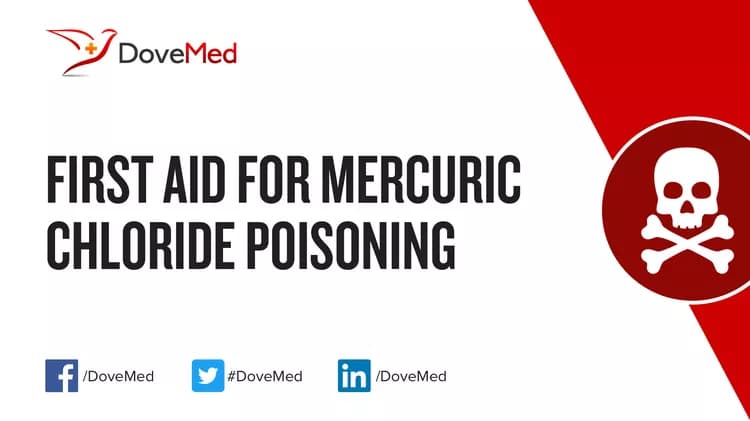What is Mercuric Chloride Poisoning?
- Mercuric chloride is a salt of mercury that is used in various industrial applications (as a catalyst, reagent, etc.). It is highly-toxic in nature. Mercuric chloride is an inorganic compound of mercury
- The compound was historically used for art preservation and photography. But now, is used in some types of dry batteries, topical antiseptic creams, and for culturing of plant tissue
- Mercuric Chloride Poisoning is the accidental or intentional intake of compounds containing the chemical.
- The condition is diagnosed based upon the clinical history, combination of signs and symptoms, and additional tests (that may include, in some cases, radiological studies and laboratory tests)
Mercuric Chloride Poisoning may be also referred to as the following:
- Corrosive Sublimate Poisoning
- Mercuric Chloride Toxicity
- Mercury Dichloride Poisoning
- Mercury(II) Chloride Poisoning
What are the Causes of Mercuric Chloride Poisoning?
- Mercuric Chloride Poisoning is caused by the ingestion/swallowing of compounds containing mercuric chloride
- This intake could be accidental, or in some cases intentional, to bring self-harm
- Mercuric chloride is a highly-toxic substance that can cause severe symptoms
Note: The compound can interact with other prescribed or non-prescribed medications in the body. Such interactions may enhance the therapeutic effects of other medications being taken, resulting in undesired side effects.
What are the Signs and Symptoms of Mercuric Chloride Poisoning?
The signs and symptoms of Mercuric Chloride Poisoning can vary from one individual to another. It may be mild in some and severe in others. Several systems of the body may be affected. The poisoning may occur due to swallowing of the compound.
The signs and symptoms of Mercuric Chloride Poisoning may include:
- Blood in stool (diarrhea)
- Severe pain in the mouth and throat; formation of mouth ulcers
- Increased salivation; unpleasant taste in the mouth
- Speaking and swallowing difficulties due to swelling of tongue and throat
- Vomiting
- Severe stomach/abdominal pain
- Breathing difficulties
- Urination difficulties (absence of urine production)
- Shock
How is First Aid administered for Mercuric Chloride Poisoning?
First Aid tips for Mercuric Chloride Poisoning:
- Call 911 or your local emergency help number immediately, for emergency assistance
- Call the Poison Control Center at 1-800-222-1222 (or your local poison control center) for further instructions
- Provide them with information such as the compound taken, quantity and time of ingestion, age, weight and general health status of affected individual
- Carefully remove the individual from the exposure area; move them to region of fresh air immediately
- Confirm that the airways are protected; also, ensure breathing and the presence of pulse
- Unless instructed by a healthcare professional, DO NOT induce vomiting in the affected individual
- Take individual to emergency room (ER) for further treatment
- Dispose contaminated clothing, while wearing protective gloves/gear, based on suitable instruction of the poison control center
- Always try to take the compound bottle/container to the ER
The emergency medical health professional might perform the following steps towards treating the condition:
- Decontaminate the individual before starting treatment (usually done by the first responders), if necessary
- Monitoring of vital signs
- Medically manage symptoms and provide breathing support, if necessary
- Administer suitable medication (chelators) to counter the effects of the toxin
- Administer fluids by an intravenous drip line
Who should administer First Aid for Mercuric Chloride Poisoning?
First aid for Mercuric Chloride Poisoning is administered by healthcare professionals.
- The individual who is affected, or someone near, should call 911 for emergency assistance (or the local emergency number)
- They should also call the poison control center at 1-800-222-1222 (or the local poison control center) and follow instructions
What is the Prognosis of Mercuric Chloride Poisoning?
- The prognosis of Mercuric Chloride Poisoning is dependent on the amount of substance consumed, time between consumption and treatment, severity of the symptoms, as well as general health status of the patient
- Severity of the poisoning and timely medical assistance are the key prognostic indicators. If treatment is provided within 10-15 minutes and suitable medication administered to remove mercury from blood, the prognosis may be improved
- Even mild cases of poisoning that is left untreated can result in severe symptoms including renal failure. Chronic low-dose poisoning can lead to permanent injury to the central nervous system
In general, toxicities are common situations in the emergency departments. A majority of the cases are often not fatal, when appropriate treatment is given.
How can Mercuric Chloride Poisoning be Prevented?
Mercuric Chloride Poisoning can be prevented by:
- Diluted compounds may also be very toxic and immediate medical assistance must be sought in case of an ingestion
- Keeping household products out of reach of children in child-proof containers
- Keeping any poisonous/hazardous chemicals and other materials out of children’s reach
- Being aware of basic first aid steps in case of an emergency (such as inadvertent poisoning)
- Keep all poisons correctly labeled and in suitable storage locations
What are certain Crucial Steps to be followed?
- Call 911 (or your local emergency number) for emergency assistance, if symptoms are life-threatening
- Call Poison Control Center at 1-800-222-1222 (or the local poison control center) and follow the recommend steps
- It would be helpful if the following information is readily available:
- Type, amount and time of consumption of the substance
- Age and weight of the individual
- And, the overall health status of the individual
Related Articles
Test Your Knowledge
Asked by users
Related Centers
Related Specialties
Related Physicians
Related Procedures
Related Resources
Join DoveHubs
and connect with fellow professionals


0 Comments
Please log in to post a comment.